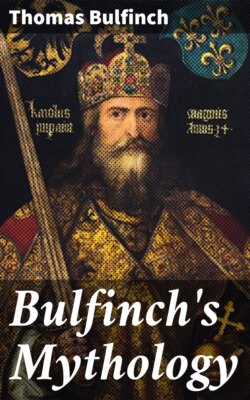Читать книгу Bulfinch's Mythology - Bulfinch Thomas - Страница 61
На сайте Литреса книга снята с продажи.
THE SEA-MONSTER
ОглавлениеPerseus, continuing his flight, arrived at the country of the Aethiopians, of which Cepheus was king. Cassiopeia his queen, proud of her beauty, had dared to compare herself to the Sea- Nymphs, which roused their indignation to such a degree that they sent a prodigious sea-monster to ravage the coast. To appease the deities, Cepheus was directed by the oracle to expose his daughter Andromeda to be devoured by the monster. As Perseus looked down from his aerial height he beheld the virgin chained to a rock, and waiting the approach of the serpent. She was so pale and motionless that if it had not been for her flowing tears and her hair that moved in the breeze, he would have taken her for a marble statue. He was so startled at the sight that he almost forgot to wave his wings. As he hovered over her he said, "O virgin, undeserving of those chains, but rather of such as bind fond lovers together, tell me, I beseech you, your name, and the name of your country, and why you are thus bound." At first she was silent from modesty, and, if she could, would have hid her face with her hands; but when he repeated his questions, for fear she might be thought guilty of some fault which she dared not tell, she disclosed her name and that of her country, and her mother's pride of beauty. Before she had done speaking, a sound was heard off upon the water, and the sea-monster appeared, with his head raised above the surface, cleaving the waves with his broad breast. The virgin shrieked, the father and mother who had now arrived at the scene, wretched both, but the mother more justly so, stood by, not able to afford protection, but only to pour forth lamentations and to embrace the victim. Then spoke Perseus: "There will be time enough for tears; this hour is all we have for rescue. My rank as the son of Jove and my renown as the slayer of the Gorgon might make me acceptable as a suitor; but I will try to win her by services rendered, if the gods will only be propitious. If she be rescued by my valor, I demand that she be my reward." The parents consent (how could they hesitate?) and promise a royal dowry with her.
And now the monster was within the range of a stone thrown by a skilful slinger, when with a sudden bound the youth soared into the air. As an eagle, when from his lofty flight he sees a serpent basking in the sun, pounces upon him and seizes him by the neck to prevent him from turning his head round and using his fangs, so the youth darted down upon the back of the monster and plunged his sword into its shoulder. Irritated by the wound, the monster raised himself in the air, then plunged into the depth; then, like a wild boar surrounded, by a pack of barking dogs, turned swiftly from side to side, while the youth eluded its attacks by means of his wings. Wherever he can find a passage for his sword between the scales he makes a wound, piercing now the side, now the flank, as it slopes towards the tail. The brute spouts from his nostrils water mixed with blood. The wings of the hero are wet with it, and he dares no longer trust to them. Alighting on a rock which rose above the waves, and holding on by a projecting fragment, as the monster floated near he gave him a death stroke. The people who had gathered on the shore shouted so that the hills reechoed the sound. The parents, transported with joy, embraced their future son-in-law, calling him their deliverer and the savior of their house, and the virgin both cause and reward of the contest, descended from the rock.
Cassiopeia was an Aethiopian, and consequently, in spite of her boasted beauty, black; at least so Milton seems to have thought, who alludes to this story in his "Penseroso," where he addresses Melancholy as the
" … goddess, sage and holy,
Whose saintly visage is too bright
To hit the sense of human sight,
And, therefore, to our weaker view
O'erlaid with black, staid Wisdom's hue.
Black, but such as in esteem
Prince Memnon's sister might beseem,
Or that starred Aethiop queen that strove
To set her beauty's praise above
The sea-nymphs, and their powers offended."
Cassiopeia is called "the starred Aethiop queen" because after her death she was placed among the stars, forming the constellation of that name. Though she attained this honor, yet the Sea-Nymphs, her old enemies, prevailed so far as to cause her to be placed in that part of the heaven near the pole, where every night she is half the time held with her head downward, to give her a lesson of humility.
Memnon was an Aethiopian prince, of whom we shall tell in a future chapter.
